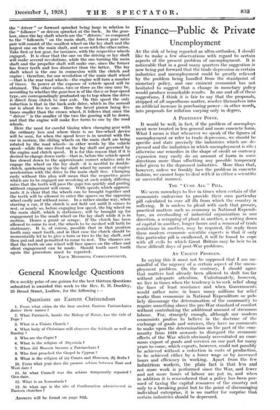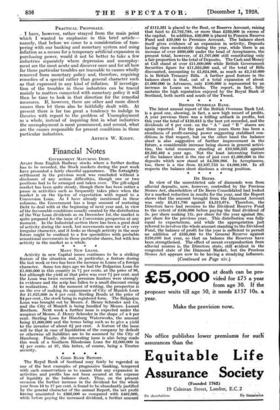Finance—Public & Private
Unemployment
AT the risk of being regarded as ultra-orthodox, I should like to make a few observations with regard to certain aspects of the present problem of unemployment. It is noticeable that in a good many quarters the suggestion is now being put forward that the trade depression in certain industries and unemployment could be greatly relieved by the problem being handled from the standpoint of monetary policy, and one eminent economist has not hesitated to suggest that a change in monetary policy would produce remarkable results. In one and all of these suggestions, I think it is fair to say that the proposals, stripped of all superfluous matter, resolve themselves into an artificial increase in purchasing power—in other wordS, into proposals for inflation varying only in degree.
A PERTINENT POINT.
It would be well, in fact, if the problem of unemploy- ment were treated in less general and more concrete form: What I mean is that whenever we speak of the figures of unemployment or refer to trade depression, we should be specific and state precisely the industries which arc de- pressed and the industries in which unemployment is rife ; otherwise our remedies in the shape of credit or currency expansion may easily do an amount of harm in some directions more than offsetting any possible temporary relief given to the depressed industries. More than that, however, unless we frankly face the problem in concrete fashion, we cannot hope to deal with it in either a scientific or successful manner.
THE " CURE ALL " PILL.
We seem nowadays to live in times when certain of the economists endeavour to provide their own particular pill calculated to cure all ills from which the country is suffering. It is useless to plead with such that prosaic, practical matters such as economy in National Expendi- ture, an overhauling of industrial organization in one direction, a scrapping of plant in another, a writing down of capital in another, longer hours and a removal of trade restrictions in another, may be required, the reply from these modern economic scientific experts is that if only this particular pill is swallowed, it will be found to cope with all evils to which Great Britain may be heir to in these difficult days of post-War problems.
AN URGENT PROBLEM.
In saying this it must not be supposed that I am un- mindful of the urgency of a certain aspect of the unem- ployment problem. On the contrary, I should agree that matters had already been allowed to drift too far without adequate attention. Unfortunately, however, we live in times when the tendency is to seek relief along the lines of least resistance and when Governments would rather raise in loans many millions for relief works than economize in National Expenditure or pub- licly discourage the determination of the community to require something above the pre-War standard of comfort without contributing the additional amount of strenuous labour. For, strangely enough, although our modern economists profess to believe in the doctrine of the exchange of goods and services, they have no comments to make upon the determination on the part of the com- munity from 1918 onwards to disregard the economic effects of the War which obviously necessitated an enor- mous export of goods and services on our part for many years to come, which exports, however, could not possibly be achieved without a reduction in costs of production; to be achieved either by a lower wage or by increased hours and efficiency in working. Apart from the few industrious workers, the plain fact is that less and not more work is performed since the War, and fewer and not more hours of labour are put in, and when in addition it is remembered that a policy has been pur- sued of taxing the capital resources of the country not only to a breaking point but to the point of discouraging individual enterprise, it is no matter for surprise that certain industries should be depressed.
PRACTICAL 'PROPOSALS.
-_ I have, however, rather strayed from the main point which I wanted to emphasize in this brief article— namely, that before we come to a consideration of tam- pering with our banking and monetary system and using inflation as a means for a temporary artificial expansion in purchasing power, would it not be better to take a few industries separately where depression and unemploy- ment are the most acute and discover once and for all how iar those particular troubles are traceable to causes wholly removed from monetary policy and, therefore, requiring remedies of a special rather than general character such as that expressed in any kind of inflation. If investiga- tion of the troubles in these industries can be traced mainly to matters connected with monetary policy it will then be time to look in that direction for the remedial measures. If, however, there are other and more direct causes then let them also be faithfully dealt with. At present there is far too great a tendency to indulge in theories with regard to the problem of Unemployment as a whole, instead of inquiring first in what industries the unemployment is most pronounced, and second, what are the causes responsible for present conditions in those particular industries.









































 Previous page
Previous page